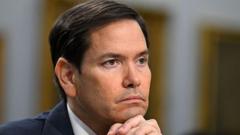The Trump administration's latest memo has directed embassies to pause new student visa appointments, citing a need to enhance social media scrutiny. This decision has heightened tensions between the administration and some leading colleges, with concerns over both funding and free speech.
US Suspends Student Visa Processing Amid Social Media Scrutiny

US Suspends Student Visa Processing Amid Social Media Scrutiny
In a controversial move, the US halts student visa appointments as it ramps up social media vetting for applicants.
The article text follows:
US President Donald Trump's administration has ordered embassies to stop scheduling new appointments for student visas while it prepares to amplify its social media vetting of applicants. A memo sent to diplomatic posts by Secretary of State Marco Rubio stated that this suspension would continue "until further guidance is issued."
The memo highlighted that there will be a significant boost in social media vetting for student and foreign exchange visas, which will have considerable implications for embassies and consulates. This shift comes amidst Trump's ongoing conflicts with various elite educational institutions that he accuses of having liberal ideologies. He claims some universities have fostered antisemitism on their campuses and maintain biased admissions practices.
According to the diplomatic cable scrutinized by CBS News, US embassies were instructed to remove all unfilled student visa appointment slots from their calendars. However, it confirmed that those who already scheduled appointments would not be affected.
The memo also disclosed that the state department is preparing to enhance its social media screening and vetting processes for all student visa applications. Traditionally, foreign students looking to study in the US must schedule an interview at the American embassy in their home country as part of the approval process. Many US colleges depend heavily on international students for a significant portion of their revenue, as these students typically pay higher tuition fees.
In response to questions about student visas, state department spokesperson Tammy Bruce affirmed on Tuesday, "We take very seriously the process of vetting who it is that comes into the country, and we're going to continue to do that."
This new enforcement comes in the wake of significant funding freezes imposed by the Trump administration on various universities, aiming to deport some students while revoking thousands of visas. Many of these actions face legal challenges, with courts blocking several policies.
The White House has specifically criticized universities such as Harvard for allowing pro-Palestinian movements that allegedly cross over into antisemitism. Educational institutions, in turn, have accused the administration of attempting to undermine free speech rights on campuses.
Harvard has been a focal point of President Trump's displeasure, as recent efforts led to the revocation of its capacity to enroll international students or host foreign researchers. However, such measures are currently impeded by a federal court ruling. Should these new vetting measures be successfully implemented, they could profoundly impact Harvard, where over a quarter of the student body comprises international students.
US President Donald Trump's administration has ordered embassies to stop scheduling new appointments for student visas while it prepares to amplify its social media vetting of applicants. A memo sent to diplomatic posts by Secretary of State Marco Rubio stated that this suspension would continue "until further guidance is issued."
The memo highlighted that there will be a significant boost in social media vetting for student and foreign exchange visas, which will have considerable implications for embassies and consulates. This shift comes amidst Trump's ongoing conflicts with various elite educational institutions that he accuses of having liberal ideologies. He claims some universities have fostered antisemitism on their campuses and maintain biased admissions practices.
According to the diplomatic cable scrutinized by CBS News, US embassies were instructed to remove all unfilled student visa appointment slots from their calendars. However, it confirmed that those who already scheduled appointments would not be affected.
The memo also disclosed that the state department is preparing to enhance its social media screening and vetting processes for all student visa applications. Traditionally, foreign students looking to study in the US must schedule an interview at the American embassy in their home country as part of the approval process. Many US colleges depend heavily on international students for a significant portion of their revenue, as these students typically pay higher tuition fees.
In response to questions about student visas, state department spokesperson Tammy Bruce affirmed on Tuesday, "We take very seriously the process of vetting who it is that comes into the country, and we're going to continue to do that."
This new enforcement comes in the wake of significant funding freezes imposed by the Trump administration on various universities, aiming to deport some students while revoking thousands of visas. Many of these actions face legal challenges, with courts blocking several policies.
The White House has specifically criticized universities such as Harvard for allowing pro-Palestinian movements that allegedly cross over into antisemitism. Educational institutions, in turn, have accused the administration of attempting to undermine free speech rights on campuses.
Harvard has been a focal point of President Trump's displeasure, as recent efforts led to the revocation of its capacity to enroll international students or host foreign researchers. However, such measures are currently impeded by a federal court ruling. Should these new vetting measures be successfully implemented, they could profoundly impact Harvard, where over a quarter of the student body comprises international students.






















